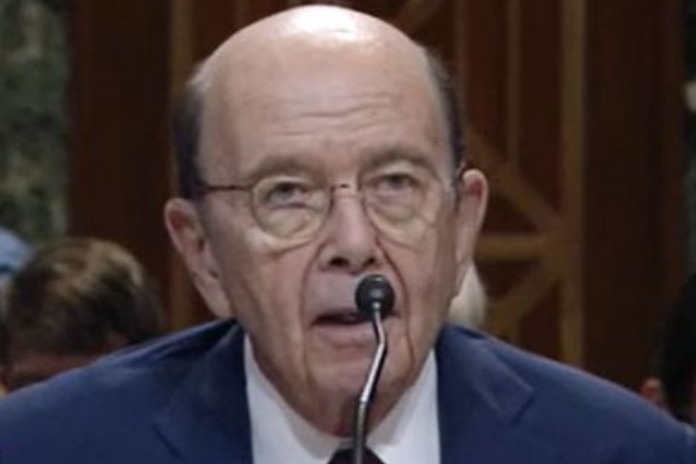By Wilbur Ross
Here at Cape Canaveral last week, SpaceX executed its 100th successful commercial Falcon 9 rocket launch, sending a crew and thousands of pounds of supplies and research gear aboard a Dragon spacecraft to the International Space Station. I am reminded of a time not long ago when travel among the stars was merely a distant goal, before it was even a race among nations.
Indeed, our country has achieved remarkable progress in the space sector, and now again as American businesspeople continue creating new ways to make space more commercially accessible. I toured such an example earlier this year, when I visited Astrobotic’s new headquarters in Pittsburgh. Their facility will support unmanned missions to the moon and drive technological development that brings us closer to NASA’s planned 2024 human moon landing.
Such landmark accomplishments in the commercial space field come alongside record-breaking economic investment in space activities. Globally, another $4.9 billion was invested in space companies in Q3 alone. This not only marks the most productive quarter on record, but it also raises the total 2020 investment to $17.5 billion in the overall industry. And the United States accounts for 62 percent of the industry’s cumulative investment. Morgan Stanley projects that the revenue generated by the global space industry may top $1 trillion by 2040.
The recent explosion in the industry here in the United States is owed in no small part to the efforts of the Trump administration. The administration’s pro-space agenda and the work of the National Space Council has already had significant impacts. NOAA has been able to remove red tape that previously surrounded remote sensing technology by shortening licensing timelines from 74 days to 28 days. This enables companies to sell data from satellites more easily and efficiently, helping commercial satellite operators stay competitive in a rapidly changing global marketplace.
The Commerce Department has also taken steps over the last year, at the behest of the vice president, to identify new space missions and get them the necessary authorization to proceed. The goal here is to alleviate the administrative and regulatory burden on emerging companies and technologies, and we enthusiastically continue on in that mission.
Financial indicators and regulatory procedures aside, one simple way to observe the growth of our space industry is to look at the sheer number of satellites in orbit. This year alone, the number of active satellites in orbit is set to increase by more than 50 percent. The Satellite Industry Association estimates that up to 110,000 new satellites could be in orbit by 2030.
This is good news for projects like SpaceX’s Starlink as well as for smaller companies that can benefit from the growing accessibility of private satellites. But the increase in satellites has also created a unique set of challenges when it comes to managing orbital traffic. We are seeing more and more frequent near misses that could create unprecedented new debris. If two significant objects were to collide, they could create a shower of debris that may endanger the astronauts aboard the International Space Station, billions of US and allied investment in space, and the growth of space commerce.
Fortunately, there is no shortage of brilliant men and women who have made remarkable headway toward managing this problem. In 2018, the Trump administration’s Space Policy Directive-3 provided a unique approach to the management of space traffic. The Commerce Department’s Office of Space Commerce and our interagency partners took on the mission laid forth by this initiative. [Today], I’m proud to report that we’re in the midst of finalizing a DOC-DOD MOU that will provide a detailed plan for the improvement of space situational awareness, and ultimately, space traffic management.
We have also drawn on existing NOAA resources to establish a new open architecture data repository. This system allows both private and government entities, including those of our allies, to share data, increasing all parties’ situational awareness amidst an increasingly crowded orbital environment. We continue to work with our allies and industry on the norms, standards and best practices that will inform new “rules of the road” in space.
We have also worked with private business and technology leaders from around the nation on this issue. In fact, just before Thanksgiving, the Office of Space Commerce hosted an industry day with over 250 companies participating to discuss our approach to the Open Architecture Data Repository. We will continue to work collaboratively with the public and private sector to tackle this challenge.
It is not the only one we face. China’s lunar landing last week underscores that we are not the only ones invested in the business of space, and that competition for American companies operating in this sector face real competition. Looking ahead, my Department’s Bureau of Economic Analysis is set to publish innovative experimental statistics within the next two weeks that will help us further measure and understand the space sector.
I look forward to sharing this informative new data with you. The United States remains an incubator for greatness like no other, and I’m confident that we will retain our position as the premier hub for space-based exploration and business.
– Remarks by Commerce Secretary Wilbur Ross at the Eighth Meeting of the National Space Council






